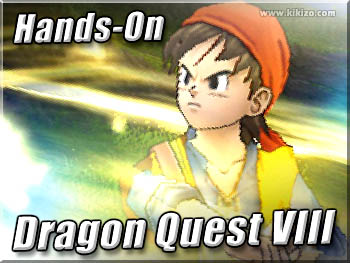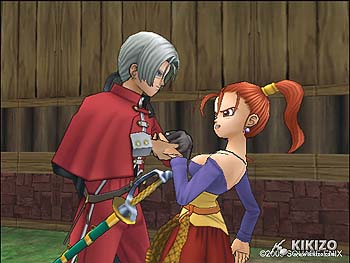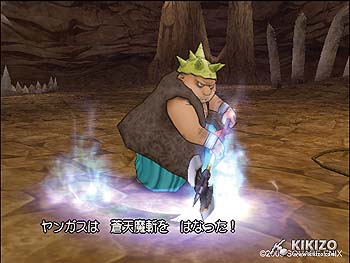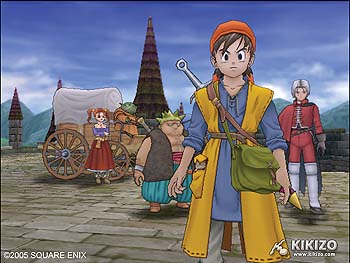Dragon Quest VIII: First Impressions
Square Enix's recent US release of its RPG opus still has no confirmed European date, but while we wait around for any announcement, here are our first impressions.
The Dragon Quest series (previously known as Dragon Warrior in the U.S.) is easily Japan's most popular gaming franchise, with the latest installment in the series selling over 3.5 million copies in Japan since its release late last year. A series whose immense popularity has also brought some great headaches to Japanese schools, employers, and law enforcement officials in the past on the respective release dates of each installment released during the days of Super Famicom.

In sharp contrast to that, the series has never been all that popular in the U.S., and has never even officially existed in Europe. Regardless, since Dragon Quest VIII: Journey of the Cursed King hit US shelves just recently, we've been able to check out the developer's efforts in fine-tuning and tweaking the gameplay, and providing enhancements over its Japanese counterpart on a number of fronts.
Some of the newly added stuff includes enhanced sound in the form of a modified orchestrated score and the inclusion of voice-overs in the U.S. version, over the text-only dialogue of the Japanese version. In addition to that, players get to enjoy navigating through a larger GUI display when accessing their menus, as well as additional animation sequences for the characters in the game. With Dragon Quest VIII marking the series' long overdue first outing on the PlayStation 2, the developers certainly seem to have put the hours in.
In the latest installment of this epic RPG series, a forbidden scepter that was slain and sealed away in Trodain Castle has been awakened from its eternal sleep, and freed from its restraints by a mysterious jester named, Dhoulmagus. Worse, Dhoulmagus used the scepter's power to place a spiteful curse on the entire kingdom, transforming its inhabitants into thorns, turning the King and the Princess into hideous beasts, as well as freezing the land in time. Fortunately, one person was unaffected by the curse, a young guardsman who serves as the hero of the story. As players take control of this young hero, they'll embark on a journey of epic proportions, setting out to rid the land of the evil jester's curse.
The gameplay is what you'd expect from a traditional console-style RPG, utilizing a number of familiar conventions along with a unique set of play features. As players navigate across the various town and field settings throughout the game, and explore dungeons and uncover hidden items, they'll interact with a variety of interesting characters and battle against a multitude of monsters. As is standard in many RPGs, players can also improve the stats of the characters in their group by leveling up with skill points acquired after successful battles.
The story mode basically has players exploring and interacting with characters, advancing the story along by triggering some of the game's event sequences. Battle mode, on the other hand, allows us to navigate the game's world map, making our way across the fields and plains of the game's expansive 3D world and giving monsters a good old battering along the way. The battles are your usual turns-based affair, with various types of attack options, magic spells, and a host of customization options at your disposal, all of which help provide Dragon Quest VIII with the type of deep, engrossing gameplay that fans of the series are accustomed to.
Aesthetically speaking, the Dragon Quest games have always featured bright, colorful 2D visuals and it's nice to see Dragon Quest VIII continue that tradition in a way by utilizing richly colored, cel-shaded graphics to maintain such a vibrant visual style as the series finally ventures into the 3D realm for the first time. In addition to that, the game features a number of well-designed and detailed, anime-styled characters designed by world famous comic book artist, Akira Toriyama, whose other claims to fame include the Dragon Ball Z franchise.
The backgrounds and environments also look pretty solid, with their sprawling 3D landscapes and lush natural settings. The only minor flaw we spotted were somewhat pixelated distant backdrops, but otherwise, everything else looks great. And as mentioned before, the U.S. version is receiving an upgrade in the animations department with improved animation sequences for the characters and monsters in the game.
As good as the game looks, the audio portion of it is another area that's received a lot of attention. The game's soundtrack consists of a thrilling orchestral score composed by renowned composer, Koichi Sugiyama, and fits all of the on-screen action and event/story sequences quite well.
In addition to that, while the Japanese version is a text-only affair, the English translated version contains another first for the series in the form of English voiceovers. While that's great and all, we honestly came away with somewhat mixed feelings about the quality of some of the voices; while some of the voices sounded pretty decent, there were a few that kind of grated, and it didn't help much that those particular voices were the most audible in the game.
All in all, our limited time so far with an epic RPG of this magnitude isn't enough to become engulfed in the magnificent fantasy world that Yuji Horii and the development crew at Level-5 have created - especially with the somewhat plodding pace at which the hero runs. Regardless, what we've played promises to be an RPG experience that fans of the series, or the genre in general, won't soon forget.
We'll almost certainly be recommending the North American version to anyone interested in DQVIII, but what are you to do if you're a European RPG fan? Right now, it looks like importing might be your best bet. Despite being Square Enix's flagship series in Japan and highly regarded in North America, the Dragon Quest series has never made a European showing. The company has become better about releasing RPGs in the region, but the sheer size of the game, the lack of familiarity with the series, and the inevitable translation issues suggest that you shouldn't wait too long before hitting up your local importer.
Joseph Jackson
Staff Writer, Kikizo Games

















 Satoru Iwata Video Interview - the late Nintendo president spoke with Kikizo in 2004 as 'Nintendo Revolution' loomed.
Satoru Iwata Video Interview - the late Nintendo president spoke with Kikizo in 2004 as 'Nintendo Revolution' loomed. Kaz Hirai Video Interview - the first of Kikizo's interviews with the man who went on to become global head of Sony.
Kaz Hirai Video Interview - the first of Kikizo's interviews with the man who went on to become global head of Sony. Ed Fries Video Interview - one of Xbox's founders discusses an epic journey from Excel to Xbox.
Ed Fries Video Interview - one of Xbox's founders discusses an epic journey from Excel to Xbox. Yu Suzuki, the Kikizo Interview - we spend time with one of gaming's most revered creators.
Yu Suzuki, the Kikizo Interview - we spend time with one of gaming's most revered creators. Tetris - The Making of an Icon: Alexey Pajitnov and Henk Rogers reveal the fascinating story behind Tetris
Tetris - The Making of an Icon: Alexey Pajitnov and Henk Rogers reveal the fascinating story behind Tetris Rare founders, Chris and Tim Stamper - their only interview? Genuinely 'rare' sit down with founders of the legendary studio.
Rare founders, Chris and Tim Stamper - their only interview? Genuinely 'rare' sit down with founders of the legendary studio. The History of First-Person Shooters - a retrospective, from Maze War to Modern Warfare
The History of First-Person Shooters - a retrospective, from Maze War to Modern Warfare